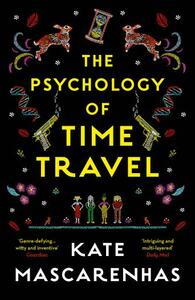Take a photo of a barcode or cover
TW/CW: murder, descriptions of a corpse, mental breakdowns, loss of a loved one, death, gore
“Time travel! I see this as an absolute win!”
The Psychology of Time Travel is a textbook example of how worldbuilding can make or break a novel. In this book’s case, it enhanced it exponentially, making for a highly nuanced and lived-in world that compelled me to no end!
So! About said worldbuilding—it was Psychology’s strongest point, and it was what consistently made it worth reading. Mascarenhas imagines a world where time travel was invented in the 60’s, and how the four women who invented it created a veritable empire out of recording the future, predicting events, and preventing occurrences from happening. But she didn’t just have time travel exist and leave it at that—every possible nuance of time travel that one can think of was explored in some way. Everything from time machine toys to time-travel law to the psychological toll of it all (hence the title) was explored in marvelous detail. All without infodumps, too; with the split POV that jumped back and forth between timelines, the information felt more like anecdotes than dumps.
Psychology’s themes of women in history and how they are treated were also a consistent standout. All of the central characters are women, and through them, Mascarenhas explores how history books overlook women, and how some things may never change; even still, all of Psychology’s women are determined, steadfast, and innovative characters. They all bring home a powerful message and sustain a plot that jumped back and forth through time—just like the rabbits that this book’s first time machines were tested on.
Psychology is a murder mystery at its heart, and for the most part, I’d call it a compelling one. However, the plot’s intricate worldbuilding was a drawback when it came to the plot. With around six or seven time periods that Psychology jumps back and forth between, it was easy for the main mystery to be lost in the threads of the vast time tapestry. I’d read a chapter, remember what happened, read the next chapter in a different timeline, then only get to the thread in the first chapter six chapters later. For the most part, Mascarenhas managed to keep it together, but it was easy to get lost.
All in all, a fascinating and intricate novel that explores time travel and all of its implications across several decades. 3.5 stars!
“Time travel! I see this as an absolute win!”
The Psychology of Time Travel is a textbook example of how worldbuilding can make or break a novel. In this book’s case, it enhanced it exponentially, making for a highly nuanced and lived-in world that compelled me to no end!
So! About said worldbuilding—it was Psychology’s strongest point, and it was what consistently made it worth reading. Mascarenhas imagines a world where time travel was invented in the 60’s, and how the four women who invented it created a veritable empire out of recording the future, predicting events, and preventing occurrences from happening. But she didn’t just have time travel exist and leave it at that—every possible nuance of time travel that one can think of was explored in some way. Everything from time machine toys to time-travel law to the psychological toll of it all (hence the title) was explored in marvelous detail. All without infodumps, too; with the split POV that jumped back and forth between timelines, the information felt more like anecdotes than dumps.
Psychology’s themes of women in history and how they are treated were also a consistent standout. All of the central characters are women, and through them, Mascarenhas explores how history books overlook women, and how some things may never change; even still, all of Psychology’s women are determined, steadfast, and innovative characters. They all bring home a powerful message and sustain a plot that jumped back and forth through time—just like the rabbits that this book’s first time machines were tested on.
Psychology is a murder mystery at its heart, and for the most part, I’d call it a compelling one. However, the plot’s intricate worldbuilding was a drawback when it came to the plot. With around six or seven time periods that Psychology jumps back and forth between, it was easy for the main mystery to be lost in the threads of the vast time tapestry. I’d read a chapter, remember what happened, read the next chapter in a different timeline, then only get to the thread in the first chapter six chapters later. For the most part, Mascarenhas managed to keep it together, but it was easy to get lost.
All in all, a fascinating and intricate novel that explores time travel and all of its implications across several decades. 3.5 stars!
dark
mysterious
reflective
fast-paced
Plot or Character Driven:
Character
Strong character development:
Complicated
Loveable characters:
Complicated
Diverse cast of characters:
No
Flaws of characters a main focus:
Yes
This one was hard
The story was interesting but really hard to follow. With the constant time jumps and array of POVs it made my head hurt. I seriously contemplated DNFing the whole time. Reading this book you really need to make a character list and take notes.
The story was interesting but really hard to follow. With the constant time jumps and array of POVs it made my head hurt. I seriously contemplated DNFing the whole time. Reading this book you really need to make a character list and take notes.
In my opinion, this is honestly a skeleton of a book. It has a very interesting plot and idea, but very little substance. The premise suggests there would be depth, but the narrative fails to deliver. I rated it 2 stars as I did finish the book - I was intrigued to see how the story played out - but overall I found it shallow and dissatisfying. The editing was also rather annoying, but I could’ve looked past that for unique characters with more personality.
This was the first book of the year. It definitely could’ve been worse, but hopefully it’s up from here :’)
This was the first book of the year. It definitely could’ve been worse, but hopefully it’s up from here :’)
adventurous
hopeful
mysterious
medium-paced
Plot or Character Driven:
Plot
Loveable characters:
Yes
Diverse cast of characters:
Yes
Flaws of characters a main focus:
Yes
Quick paced mystery
This book is written from many different perspectives which all intertwined over time. It took me a while to figure out all of the links between the characters as they travel through time and there are a lot of names haha. As the chapters were small I feel as though I read this book really fast. I loved that the appendix included the tests referenced throughout the book and how everything tied up at the end.
This book is written from many different perspectives which all intertwined over time. It took me a while to figure out all of the links between the characters as they travel through time and there are a lot of names haha. As the chapters were small I feel as though I read this book really fast. I loved that the appendix included the tests referenced throughout the book and how everything tied up at the end.
The premise of this story is unique and fascinating: four women in the 60s discover time-travelling and fifty years later they, their relatives and lots of other wonderful women still have to deal with the repercussions of what went down around the time of the discovery.
The Psychology of Time Travel is a really interesting book from start to finish. I find the concept so unique and it was just so enjoyable to try and piece together what happened or what is going to happen. This book asks questions I have never read a book about: What effects does time-travel have on the travellers? How can you solve a crime without changing history?
While I loved the concept a lot I, however, didn't quite love the execution as much. I never felt particularly connected to the story and the plot was interesting but not really gripping and lacked in drive and stakes. I also had some problems with how time-travel works in this novel. It never got explained how certain things work or how the Conclave is able to have such a huge unquestioned authority and I really missed these explanations.
Also, while all women in this novel are fascinating and diverse and I loved reading about their different roles and reactions, many times I couldn't understand their reasoning and choices at all. I felt like the characters have such a huge potential but this potential isn't turned into actual development too often.
Still, I had a good time reading this novel and it certainly offered a very interesting perspective on time-travel and its effects.
I received a copy of this book via NetGalley/Crooked Lane Books.
The Psychology of Time Travel is a really interesting book from start to finish. I find the concept so unique and it was just so enjoyable to try and piece together what happened or what is going to happen. This book asks questions I have never read a book about: What effects does time-travel have on the travellers? How can you solve a crime without changing history?
While I loved the concept a lot I, however, didn't quite love the execution as much. I never felt particularly connected to the story and the plot was interesting but not really gripping and lacked in drive and stakes. I also had some problems with how time-travel works in this novel. It never got explained how certain things work or how the Conclave is able to have such a huge unquestioned authority and I really missed these explanations.
Also, while all women in this novel are fascinating and diverse and I loved reading about their different roles and reactions, many times I couldn't understand their reasoning and choices at all. I felt like the characters have such a huge potential but this potential isn't turned into actual development too often.
Still, I had a good time reading this novel and it certainly offered a very interesting perspective on time-travel and its effects.
I received a copy of this book via NetGalley/Crooked Lane Books.
Four women invent a time machine, but unusually this book focuses on what happens when their invention is utilised commercially. For me this book was very dark in places examining the psychological impact of time travel where any sign of weakness to do with mental health was cause for dismissal as a time traveler and what some people would be willing to do to keep jumping. I'm glad I read it, I liked most of the characters and it definitely made me think about time travel in a new way so I've given it 5 stars, but I would be cautious about who I would suggest read it.




